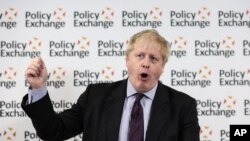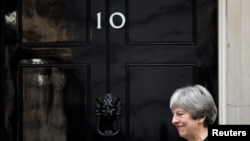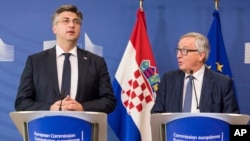British Foreign Secretary Boris Johnson Wednesday faced a backlash in seeking to allay fears over Britain's pending exit from the European Union as the government kicked off a campaign to calm doubters and silence critics of the move known as Brexit.
In one of a series of speeches by government ministers to promote Brexit, Johnson tried to urge Britons to rally around a vision of a better future outside the bloc. Johnson was quoted as saying the move was not grounds for fear, but hope and that the 2016 vote in favor of Brexit was about "going global." Johnson's efforts, however, appeared to highlight divisions over the kind of relationship Britain wants with the EU after the break occurs in March of next year.
Johnson's speech in London was met with a tepid response from an audience generally in tune with his idea of the country opting for a sharp break from the EU. To some, the six seconds of muted applause he received added to the sense that members of Prime Minister Theresa May’s government have still failed to agree among themselves on exactly what they want out of protracted negotiations with the EU, Britain's largest trading partner. Johnson was accused by critics of delivering an “un-serious speech.”
Prime Minister May and other Cabinet ministers will be outlining over the next few days Britain’s Brexit future, as far as they see it. Johnson has been given the star role of persuading the half of the country that doesn’t want to leave the EU that there is nothing to fear from not only ending membership in the bloc, but in exiting the single market and its customs union.
Key takeaways from Johnson's remarks included that young British men will still be able, post-Brexit, to enjoy wild stag (bachelor)parties in central Europe - something that won’t necessarily reassure the residents of Prague, Budapest or Krakow, who are increasingly irritated by the rowdiness of young vacationing British males.
“We will continue ever more intensively to go on cheapo flights to stag parties in ancient cities, meet interesting people, fall in love, struggle amiably to learn the European languages whose decline has been a paradoxical feature of EU membership,” he said.
“There is no sensible reason why we should not be able to retire to Spain, as indeed we did long before Spain joined the EU, or anywhere else,” Johnson said.
“If this is what Johnson means by ‘reaching out’, he's doing it wrong,” said political commentator Stephen Bush, as he questioned the tone of Johnson's speech, in which the foreign secretary made a joke about sex tourism in Thailand and predicted that British cuisine wouldn’t return to the pre-Brexit 1950s of dreary "spam, cabbage and liver.”
Johnson's comments included the insistence that Britain could be “more global” outside Europe’s customs union and single market than remaining in them.
“In a global marketplace, where we are trading in products that hadn’t been conceived even five years ago, serving markets that were poverty stricken only 20 years ago, it seems extraordinary that the UK should remain lashed to the minute prescriptions of a regional trade bloc,” he said.
Conservative lawmakers criticized Johnson for his remarks, saying he failed to explain why Britain would be able to negotiate better trade deals on its own with non-EU countries than the EU can for all members of the bloc. His call for Britain to diverge from EU regulations and product standards also drew the ire of British business leaders.
“We do not make the UK more attractive to the rest of the world by putting barriers in the way of trade with our biggest market. Whilst there may be areas where the UK wants to diverge from EU rules in the future, these are likely to be limited as the gains from divergence would have to outweigh the very significant benefits of having alignment with our closest trading partner,” said Antony Walker, the chief executive of the technology industry body techUK.
“Businesses aren’t looking for a bonfire of regulation - quite the opposite - our aerospace, automotive and chemical sectors, to name a few, all have highly integrated European supply chains that benefit from consistent regulation,” warned John Foster of the Confederation of British Industry, a major business lobbying group.
May’s Cabinet is sharply split between ministers led by the country’s finance minister, Philip Hammond, who want Britain to maintain a close relationship, like Norway, with the EU post-Brexit, including maintaining membership of the bloc’s customs union and membership of the single market, and ministers like Johnson, who favor a sharp break.
European Commission President Jean-Claude Juncker lashed out at Johnson for the foreign secretary’s claim that officials in Brussels are attempting to build an EU superstate, saying the allegation is “total nonsense.”
"Some in the British political society are against the truth, pretending that I am a stupid, stubborn federalist, that I am in favor of a European superstate," he told a press conference Wednesday in the wake of Johnson’s speech. “I am strictly against a European superstate. We are not the United States of America, we are the European Union,” he added.
An EU official told VOA that he fears Johnson’s speech will add to the increasing toxicity of the negotiations between London and Brussels. They remain at loggerheads over issues including the rights of EU citizens living in Britain.
Last Friday, the EU’s lead negotiator, Michel Barnier, and Britain’s Brexit minister David Davis engaged in a war of words. Barnier accused Britain of making unacceptable demands by wanting access to the single market, but without any of the obligations that actual membership entails.
And at a news conference in Brussels, Barnier didn’t disguise his frustration, warning, “I don’t understand some of the positions of the UK…I am surprised by these disagreements. The positions of the EU are very logical...If these disagreements persist, there will undoubtedly be a problem.” The British side publicly accuses the EU negotiators of bullying.
Johnson also came under fire from Conservative lawmakers. Sarah Wollaston, the type of pro-Remain lawmaker the foreign secretary says he wants to reassure, tweeted, “Now we urgently need a serious speech that addresses the reality of the practical issues.”






